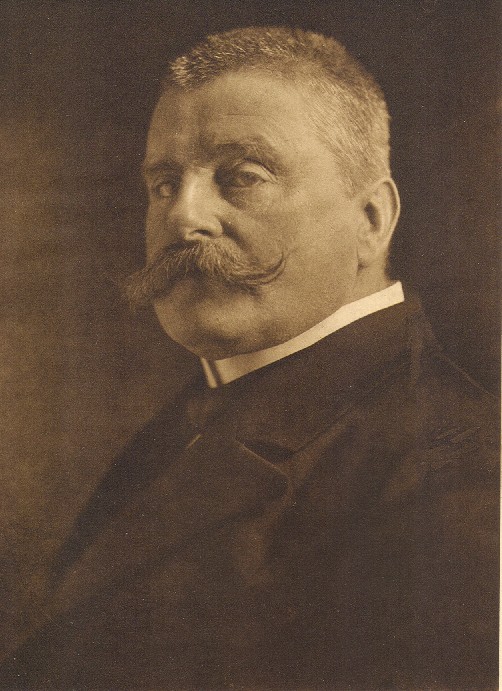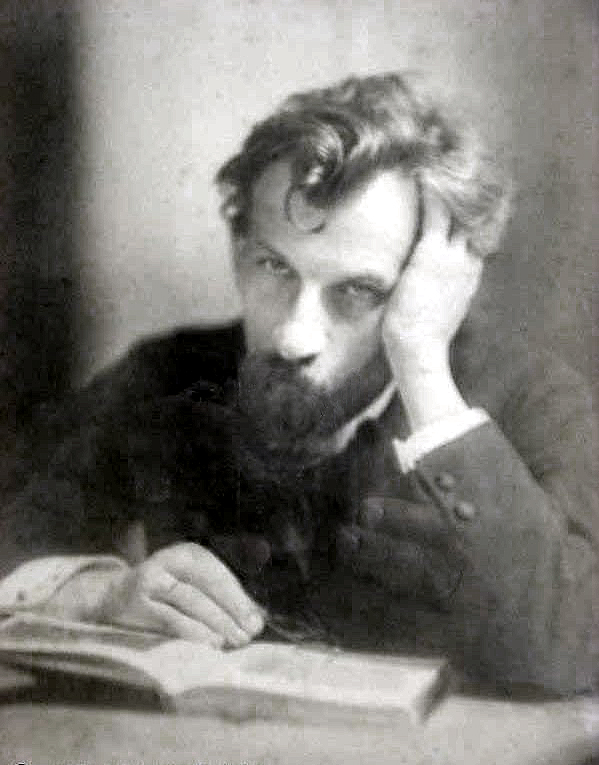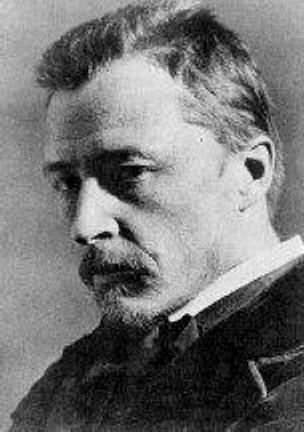|
Sehnsucht (Strauss)
"Sehnsucht" ("Longing" or "Yearning") is an art song for voice and piano composed by Richard Strauss in 1896, setting a poem of the same title by the German poet Detlev von Liliencron (1844–1909). It is the second song in his collection ''Five songs for voice and piano'', Op. 32, TrV 174. Composition history Liliencron was twenty years older than Strauss, his father an impecunious Baron and his mother an American general's daughter, who for much of his life was in the Prussian army including active service in two wars. He was an influence on poets such as Otto Bierbaum and Rainer Maria Rilke and also the composer Hugo Wolf. Strauss was to set four songs by him, "Sehnsucht" being the first. It was composed over 2 days in January 1896 and was published in a set of five songs. Jefferson writes that "The lied is notable for the basic two-bar phrase in the piano part - really, a notable stroke, this - and of course the marvellously successful suspension, so unexpected, yet so r ... [...More Info...] [...Related Items...] OR: [Wikipedia] [Google] [Baidu] |
Lied
In Western classical music tradition, (, plural ; , plural , ) is a term for setting poetry to classical music to create a piece of polyphonic music. The term is used for any kind of song in contemporary German, but among English and French speakers, is often used interchangeably with " art song" to encompass works that the tradition has inspired in other languages as well. The poems that have been made into lieder often center on pastoral themes or themes of romantic love. The earliest lied date from the late fourteenth or early fifteenth centuries, and can even refer to from as early as the 12th and 13th centuries. It later came especially to refer to settings of Romantic poetry during the late eighteenth and nineteenth centuries, and into the early twentieth century. Examples include settings by Joseph Haydn, Wolfgang Amadeus Mozart, Ludwig van Beethoven, Franz Schubert, Robert Schumann, Johannes Brahms, Hugo Wolf, Gustav Mahler or Richard Strauss. History For Ger ... [...More Info...] [...Related Items...] OR: [Wikipedia] [Google] [Baidu] |
Tristan Und Isolde
''Tristan und Isolde'' (''Tristan and Isolde''), WWV 90, is an opera in three acts by Richard Wagner to a German libretto by the composer, based largely on the 12th-century romance Tristan and Iseult by Gottfried von Strassburg. It was composed between 1857 and 1859 and premiered at the Königliches Hoftheater und Nationaltheater in Munich on 10 June 1865 with Hans von Bülow conducting. Wagner referred to the work not as an opera, but called it "" (literally ''a drama'', ''a plot'', or ''an action''). Wagner's composition of ''Tristan und Isolde'' was inspired by the philosophy of Arthur Schopenhauer (particularly ''The World as Will and Representation''), as well as by Wagner's affair with Mathilde Wesendonck. Widely acknowledged as a pinnacle of the operatic repertoire, ''Tristan'' was notable for Wagner's unprecedented use of chromaticism, tonal ambiguity, orchestral colour, and harmonic suspension. The opera was enormously influential among Western classical com ... [...More Info...] [...Related Items...] OR: [Wikipedia] [Google] [Baidu] |
Norman Del Mar
Norman René Del Mar CBE (31 July 19196 February 1994) was a British conductor, horn player, and biographer. As a conductor, he specialised in the music of late romantic composers; including Edward Elgar, Gustav Mahler, and Richard Strauss. He left a great legacy of recordings of British music, in particular Elgar, Ralph Vaughan Williams, Frederick Delius, and Benjamin Britten. He notably conducted the premiere recording of Britten's children's opera ''Noye's Fludde''. Life and career Born in Hampstead, London, Del Mar began his career as a horn player. He was one of the original members of the Royal Philharmonic Orchestra (RPO), which was established by Sir Thomas Beecham in 1946. Within the first few months of the RPO's existence, Beecham appointed Del Mar as his assistant conductor. Del Mar made his professional debut as a conductor with the RPO in 1947. In 1949 Del Mar was appointed principal conductor of the English Opera Group, in which post he remained until 1954. I ... [...More Info...] [...Related Items...] OR: [Wikipedia] [Google] [Baidu] |
Sehnsucht
() is a German noun translated as "longing", "desire", "yearning", or "craving". Some psychologists use the word to represent thoughts and feelings about all facets of life that are unfinished or imperfect, paired with a yearning for ideal alternative experiences. Etymology and language change A suffering reference of the word Sehnsucht in Middle High German usage is associated with "Siechtum" in the German dictionary as follows: Weakening the disease reference, the word later denoted the high "degree of a violent and often painful longing for something, especially when one has no hope of attaining what is desired, or when attainment is uncertain, still distant." The word "Sehnsucht" is used as a Germanism in some other languages. Because of its vagueness, analogous terms cannot easily be cited. Portuguese language has the similar but not identical term saudade. ''Sehnsucht'' in mythology In Greek mythology, Erotes is the god of loving ''Sehnsucht'', found with Eros in the ... [...More Info...] [...Related Items...] OR: [Wikipedia] [Google] [Baidu] |
D V Lilienkron 1905
D, or d, is the fourth letter in the Latin alphabet, used in the modern English alphabet, the alphabets of other western European languages and others worldwide. Its name in English is ''dee'' (pronounced ), plural ''dees''. History The Semitic letter Dāleth may have developed from the logogram for a fish or a door. There are many different Egyptian hieroglyphs that might have inspired this. In Semitic, Ancient Greek and Latin, the letter represented ; in the Etruscan alphabet the letter was archaic, but still retained (see letter B). The equivalent Greek letter is Delta, Δ. Architecture The minuscule (lower-case) form of 'd' consists of a lower-story left bowl and a stem ascender. It most likely developed by gradual variations on the majuscule (capital) form 'D', and today now composed as a stem with a full lobe to the right. In handwriting, it was common to start the arc to the left of the vertical stroke, resulting in a serif at the top of the arc. This serif ... [...More Info...] [...Related Items...] OR: [Wikipedia] [Google] [Baidu] |
Hans Erich Pfitzner
Hans Erich Pfitzner (5 May 1869 – 22 May 1949) was a German composer, conductor and polemicist who was a self-described anti- modernist. His best known work is the post-Romantic opera '' Palestrina'' (1917), loosely based on the life of the sixteenth-century composer Giovanni Pierluigi da Palestrina and his ''Missa Papae Marcelli''. Life Pfitzner was born in Moscow where his father played cello in a theater orchestra. The family returned to his father's native town Frankfurt in 1872, when Pfitzner was two years old, he always considered Frankfurt his home town. He received early instruction in violin from his father, and his earliest compositions were composed at age 11. In 1884 he wrote his first songs. From 1886 to 1890 he studied composition with Iwan Knorr and piano with James Kwast at the Hoch Conservatory in Frankfurt. (He later married Kwast's daughter Mimi Kwast, a granddaughter of Ferdinand Hiller, after she had rejected the advances of Percy Grainger.) He ta ... [...More Info...] [...Related Items...] OR: [Wikipedia] [Google] [Baidu] |
Anton Dermota
Kammersänger Anton Dermota (June 4, 1910 – June 22, 1989) was a Slovene lyric tenor. Early life He was born in a poor family in the Upper Carniolan village of Kropa in what was then the Austro-Hungarian Empire (and is now in Slovenia). He went to the Ljubljana Conservatory with the intention of studying composition and organ, but in 1934 he received a scholarship which sent him to Vienna. There, he devoted himself exclusively to vocal study with Marie Radó. Career Dermota made his debut at the opera in Cluj in 1934, and was promptly invited by Bruno Walter to perform at the Vienna State Opera. Here he made his début as "First Man in Armor" in Wolfgang Amadeus Mozart's ''The Magic Flute'' in 1936 and got a contract immediately. His first leading role was Alfredo in Giuseppe Verdi's ''La traviata'', which he sang in 1937. In the same year Dermota made his début at the Salzburg Festival in a production of Wagner's ''Die Meistersinger von Nürnberg'', conducted by ... [...More Info...] [...Related Items...] OR: [Wikipedia] [Google] [Baidu] |
Bavarian State Opera
The Bayerische Staatsoper is a German opera company based in Munich. Its main venue is the Nationaltheater München, and its orchestra the Bayerische Staatsorchester. History The parent ensemble of the company was founded in 1653, under Electress consort Princess Henriette Adelaide of Savoy, when Giovanni Battista Maccioni's ''L'arpa festante'' was performed in the court theatre. In 1753, the Residence Theatre (Cuvilliés Theatre) was opened as a major stage. While opera performances were also held in the Prinzregententheater (completed in 1901), the company's home base is the Nationaltheater München on Max-Joseph-Platz. In 1875, the Munich Opera Festival took place for the first time. Sir Peter Jonas became the general manager in 1993, the first British general manager of any major German-speaking opera house. In 2008, Nikolaus Bachler became Intendant (general manager) of the opera company, and Kirill Petrenko became Generalmusikdirektor (GMD) in 2013. In 2014, the ... [...More Info...] [...Related Items...] OR: [Wikipedia] [Google] [Baidu] |
Hugo Wolf
Hugo Philipp Jacob Wolf (13 March 1860 – 22 February 1903) was an Austrian composer of Slovene origin, particularly noted for his art songs, or Lieder. He brought to this form a concentrated expressive intensity which was unique in late Romantic music, somewhat related to that of the Second Viennese School in concision but diverging greatly in technique. Though he had several bursts of extraordinary productivity, particularly in 1888 and 1889, depression frequently interrupted his creative periods, and his last composition was written in 1898, before he suffered a mental collapse caused by syphilis. Early life (1860–1887) Hugo Wolf was born in Windischgrätz in the Duchy of Styria (now Slovenj Gradec, Slovenia), then a part of the Austrian Empire. Herbert von Karajan was related to him on his maternal side. He spent most of his life in Vienna, becoming a representative of a "New German" trend in Lieder, a trend which followed from the expressive, chromatic and d ... [...More Info...] [...Related Items...] OR: [Wikipedia] [Google] [Baidu] |
Richard Strauss
Richard Georg Strauss (; 11 June 1864 – 8 September 1949) was a German composer, conductor, pianist, and violinist. Considered a leading composer of the late Romantic and early modern eras, he has been described as a successor of Richard Wagner and Franz Liszt. Along with Gustav Mahler, he represents the late flowering of German Romanticism, in which pioneering subtleties of orchestration are combined with an advanced harmonic style. Strauss's compositional output began in 1870 when he was just six years old and lasted until his death nearly eighty years later. While his output of works encompasses nearly every type of classical compositional form, Strauss achieved his greatest success with tone poems and operas. His first tone poem to achieve wide acclaim was ''Don Juan'', and this was followed by other lauded works of this kind, including ''Death and Transfiguration'', ''Till Eulenspiegel's Merry Pranks'', ''Also sprach Zarathustra'', ''Don Quixote'', ''Ein Heldenleben' ... [...More Info...] [...Related Items...] OR: [Wikipedia] [Google] [Baidu] |
Rainer Maria Rilke
René Karl Wilhelm Johann Josef Maria Rilke (4 December 1875 – 29 December 1926), shortened to Rainer Maria Rilke (), was an Austrian poet and novelist. He has been acclaimed as an idiosyncratic and expressive poet, and is widely recognized as a significant writer in the German language.Biography: Rainer Maria Rilke 1875–1926 Poetry Foundation website. Retrieved 2 February 2013. His work has been seen by critics and scholars as having undertones of , exploring themes of subjective experience and disbelief. His writings include one novel, several collections of poetry and several volumes ... [...More Info...] [...Related Items...] OR: [Wikipedia] [Google] [Baidu] |
Otto Bierbaum
Otto Julius Bierbaum (28 June 1865 – 1 February 1910) was a German writer. Bierbaum was born in Grünberg, Silesia. After studying in Leipzig, he became a journalist and editor for the journals ''Die freie Bühne'', ''Pan'' and '' Die Insel''. His literary work was varied. As a poet he used forms like the '' Minnesang'' or the folksong and the Anacreontics style. In 1897 Bierbaum published his novel ''Stilpe'' which inspired Ernst von Wolzogen to establish, in 1901, the first cabaret venue ever in Berlin, the '' Überbrettl'' . His novel ''Zäpfel Kerns Abenteuer'' was an adaptation of Carlo Collodi's '' Pinocchio''. Bierbaum's final novel, ''Yankeedoodlefahrt'', was published in 1909 and is the source of the winged words "''Humor ist, wenn man trotzdem lacht''" ("Humor is when you laugh anyway"), which has become a proverb in modern German. Bierbaum died at Kötzschenbroda near Dresden. Works * ''Erlebte Gedichte'' (1892) ** "Traum durch die Dämmerung" * ''Die Schlang ... [...More Info...] [...Related Items...] OR: [Wikipedia] [Google] [Baidu] |








